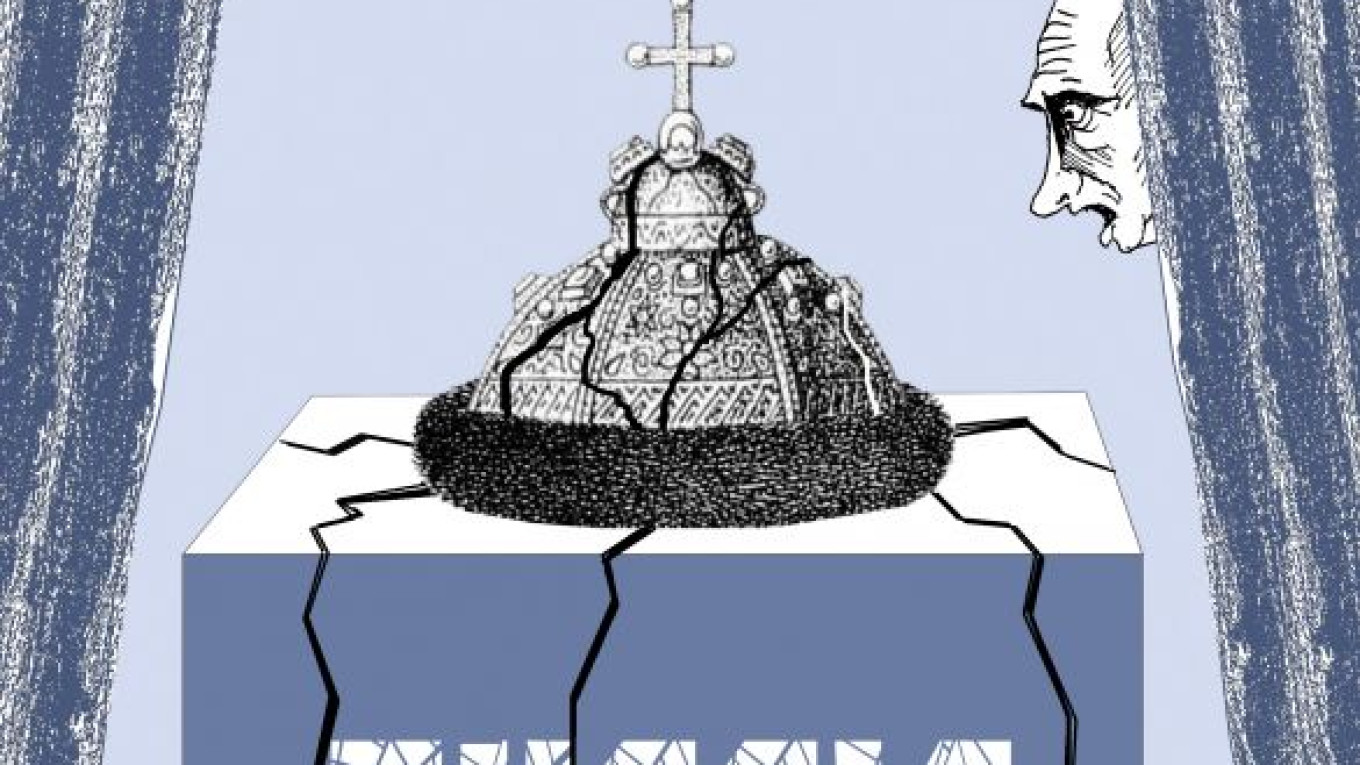Vladimir Putin’s repossession of the presidency has been met with widespread derision both at home and abroad. But the autocrat’s return to the Kremlin could be Russia’s best hope to escape stagnation.
Putin has shown open contempt for Russian society, which has been exemplified by his mocking response to widespread demonstrations. It has also been exemplified by his arrogance, readiness to stifle dissent and his fear of competition. Putin has singlehandedly quashed the long-held myth that he himself propagated — that personalized power can modernize the country while preserving stability.
To be sure, Putin’s Kremlin and his corrupt cohorts still call the shots. While his decision to return to the presidency has vexed the most dynamic elements of Russia’s urban population, the rest of the country’s citizens remain unhappy but quiescent. Likewise, Russia’s demoralized intellectuals and political class, on whom the population relies to advocate change, neglect to act. The endemic fear of change, the lack of a viable alternative and reliance on state handouts are keeping Russia in a state of inertia.
Moreover, Putin’s Kremlin has used the West, which is eager to “reset” relations with Russia, to legitimize its authoritarian rule and to provide opportunities for its venal cronies’ integration into Western society. Indeed, by using the West to launder their dirty money, Putin and his cohorts have, in a way, avenged the Soviet Union’s collapse by undermining the West’s principles and discrediting liberal democracy in the eyes of many Russians.
But cracks are forming in Russian society, threatening the status quo. It is not the opposition or popular rebellion that are destabilizing Putin’s regime but the very forces that have helped to keep it afloat.
After waiting 12 years for change from the top, Russians finally understand that their political system can be transformed only from the bottom — through popular revolution. In the absence of institutional channels for expression of their grievances over the corrupt concessions that have preserved the ruling elite’s power, they must take to the streets.
But this time will Russia escape its traditional final act, in which the new regime turns out to be more predatory than the previous one? Or will Russians find a way to pursue peaceful revolution?
Today, the Kremlin is contributing to its own violent demise, intentionally demoralizing Russian society. It discredits liberalism by employing liberal rhetoric and appointing liberal leaders to administer its authoritarian rule, leaving political opposition to leftist parties and nationalists.
Putin’s return to the Stalinist practice of sending police to search opponents’ homes, combined with his attempts to ignite hostility between social groups — for example, between provincial Russia and the urban middle class — is deepening antagonism and distrust among citizens. In this way, Putin’s regime intensifies political dissenters’ longing for retaliation, thereby hindering peaceful change.
Already, long-standing tensions have begun to boil over. Tens of thousands of people have taken to the streets since Putin’s 2011 announcement that he would reclaim the presidency. His return to the Kremlin has incited some of the largest protests that Moscow has seen since the 1990s. While popular demonstrations have diminished — largely as a result of draconian new anti-protest laws — the more conflict that accumulates beneath the surface, the more devastating the eventual explosion will be.
By censoring the media, discrediting the moderate opposition and provoking popular discontent, Putin is playing with fire. It is impossible to predict when Russia will detonate, but the system’s undeniable fissures are growing.
The Kremlin, far from being able to control the situation, does not fully grasp what is happening. Russia is moving toward a large, ominous precipice. Massive capital flight and efforts by Kremlin cronies to engineer a safe landing for themselves in the West show that even in the eyes of Putin’s cohorts, the end of his era is approaching.
Yet Putin’s Kremlin continues to work tirelessly to prevent the formation of a strong opposition, thus increasing the risk that the regime will collapse without a viable alternative. The longer Putin remains in power, the more devastating his regime’s final act will be.
Both Russia and the West must start planning ahead. Regrettably, Russia’s awakening corresponds with the beginning of the West’s seeming decline. Nonetheless, rather than remaining complicit in Putin’s corrupt regime, the West must help Russians in their search for a new destiny.
Russians should not give up hope. Putin’s return to the Kremlin, although painful, could end up curtailing their agony by triggering the regime’s destruction. When the choice is between an outdated system’s implosion or its slow degradation, a swift, clean break typically offers better prospects for a new start.
Lilia Shevtsova is senior associate of the Carnegie Endowment for International Peace in Moscow. © Project Syndicate
A Message from The Moscow Times:
Dear readers,
We are facing unprecedented challenges. Russia's Prosecutor General's Office has designated The Moscow Times as an "undesirable" organization, criminalizing our work and putting our staff at risk of prosecution. This follows our earlier unjust labeling as a "foreign agent."
These actions are direct attempts to silence independent journalism in Russia. The authorities claim our work "discredits the decisions of the Russian leadership." We see things differently: we strive to provide accurate, unbiased reporting on Russia.
We, the journalists of The Moscow Times, refuse to be silenced. But to continue our work, we need your help.
Your support, no matter how small, makes a world of difference. If you can, please support us monthly starting from just $2. It's quick to set up, and every contribution makes a significant impact.
By supporting The Moscow Times, you're defending open, independent journalism in the face of repression. Thank you for standing with us.
Remind me later.


